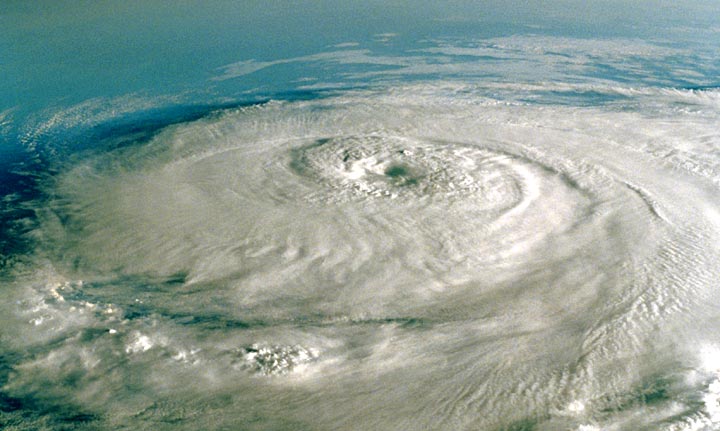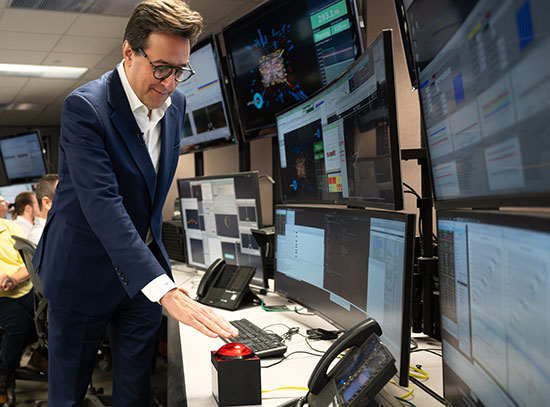East Coasters Brave Hurricane Sandy, Keep Neutrino Project On Schedule
Hurricane Sandy hit the night before an important project review, but scientists, engineers, and project personnel didn’t let that stand in their way
November 9, 2012
This story, written by Kathryn Jepsen of Fermilab’s Office of Communication, appeared online November 5 in Symmetry, a joint Fermilab/SLAC publication.

Physicist Milind Diwan of BNL has devoted much time and energy to neutrino research over the years, but perhaps never so literally as he did last week.
Diwan is co-spokesperson of the proposed Long Baseline Neutrino Experiment (LBNE), which aims to measure properties of neutrinos and test understanding of their role in the universe. LBNE was scheduled for an important review at Fermi National Accelerator Laboratory, just outside Chicago, at the end of October. Diwan had tickets to travel from his home on Long Island on Monday, October 29 — the day Hurricane Sandy hit the East Coast.
His flight was canceled.
About 30 scientists, engineers, and other project personnel who meant to attend the review are based at BNL, and still others live elsewhere on the East Coast. Many of them flew out by Sunday, but Diwan and 14 others who planned to travel on Monday were stranded.
This was a meeting they did not want to postpone. “It was very important that we attend this particular milestone,” Diwan says.
More than 300 scientists from about 60 institutions participate in the LBNE collaboration. The review, scheduled since July, would examine whether the experiment was ready for DOE’s second stage of approval, Critical Decision 1. The collaboration had done some major reconfiguring at DOE’s request since passing the first stage of approval in January 2010, and they needed a successful review to move forward.
“I tried to change my reservation for Sunday when I saw my [Monday] flight was canceled,” says Penka Novakova, LBNE’s far detector project controls specialist and a resident of Port Jefferson on Long Island. “There were no seats. On Amtrak, there was only one seat on Monday. And then the trains were canceled too.”
The marooned BNL employees, along with others in places such as Connecticut and Washington, D.C., made plans to call in to the review from work or home. But that was while they still had electricity. “It was clear that we were going to have power failures,” Diwan says.
On Monday, as participants prepared for the review, it began to rain on the East Coast. “The wind picked up, and it slowly increased in intensity,” Diwan says. “Eventually it was howling.” Gusts began to snap tree limbs.
That evening, reviewers and reviewees held hostage by the hurricane called their colleagues at Fermilab and elsewhere to create contingency plans in case they lost contact. Thirty minutes into their conversations, the lights went out. Their landlines suddenly cut off, and they could no longer charge their cell phones.
The next day, the first day of the review, most Long Islanders were still without power. “It was dark and deserted,” Novakova says. “Apocalyptic.”
But the stranded were not willing to give up on taking part. Novakova had given her presentation slides to a colleague who was able to reach Fermilab. Diwan spent the entire day calling into the meeting on his cell phone, listening to one presentation at a time and then reviving his battery with a hand-crank charger.
“It takes a lot of cranking,” he says. “You need to crank for a good 15 minutes to get one bar of charge.”
Novakova and Diwan were not the only LBNE collaborators to take extra measures to make sure the LBNE review went on through the hurricane. Other review participants, at least one of whom spent the night in a shelter, charged phones in their cars or called from neighbors’ homes. “They were very active,” says Elaine McCluskey, LBNE project manager, who participated from Fermilab.
The next day, BNL reopened, giving people without working phones or electricity the chance to call in to the review. Novakova carpooled in with colleagues to avoid emptying her tank during the storm-related gasoline shortage.
On Thursday, November 1, the review committee at Fermilab held their closeout session, in which a series of reviewers gave their opinions on different aspects of the project. Each presenter commended the LBNE collaboration members on their thorough preparation and evident commitment to making the review — and the experiment — happen.
One by one, they concluded their talks with the same recommendation: DOE should advance LBNE to the next stage of the approval process.
“A lot of people have put their sweat and blood into this, and it shows,” Diwan says.
A board at DOE will now take the reviewers’ conclusions into consideration and could make their decision about LBNE as early as December. If they send the project to the next stage, the scientists will receive additional funds and the go-ahead to start their next phase of design, prototyping, and testing.
Until then, LBNE scientists have the reassurance that even a hurricane cannot hold them back.
2012-3467 | INT/EXT | Newsroom









